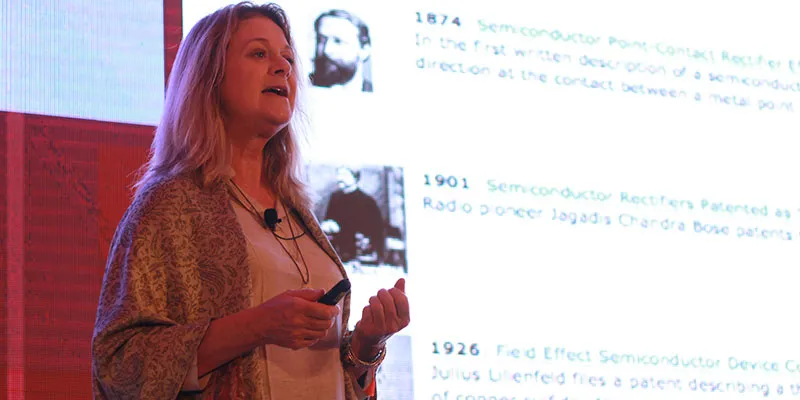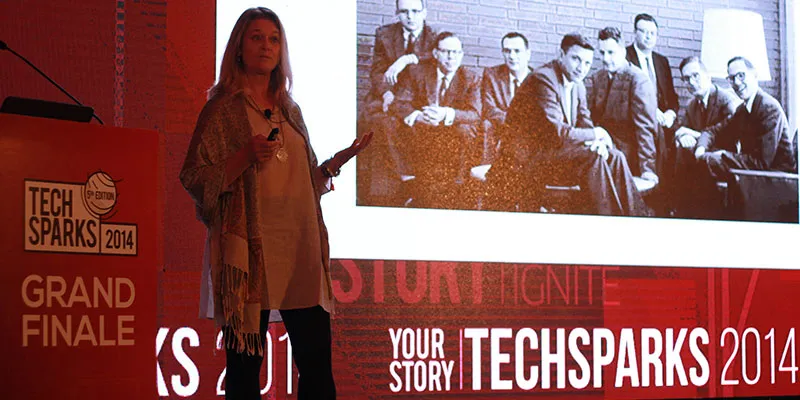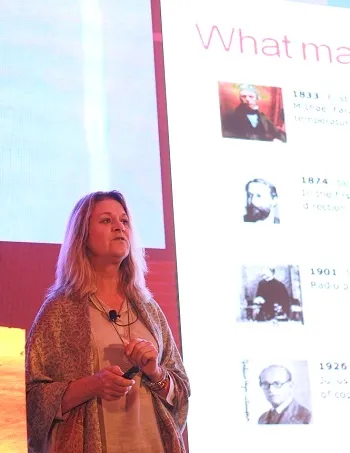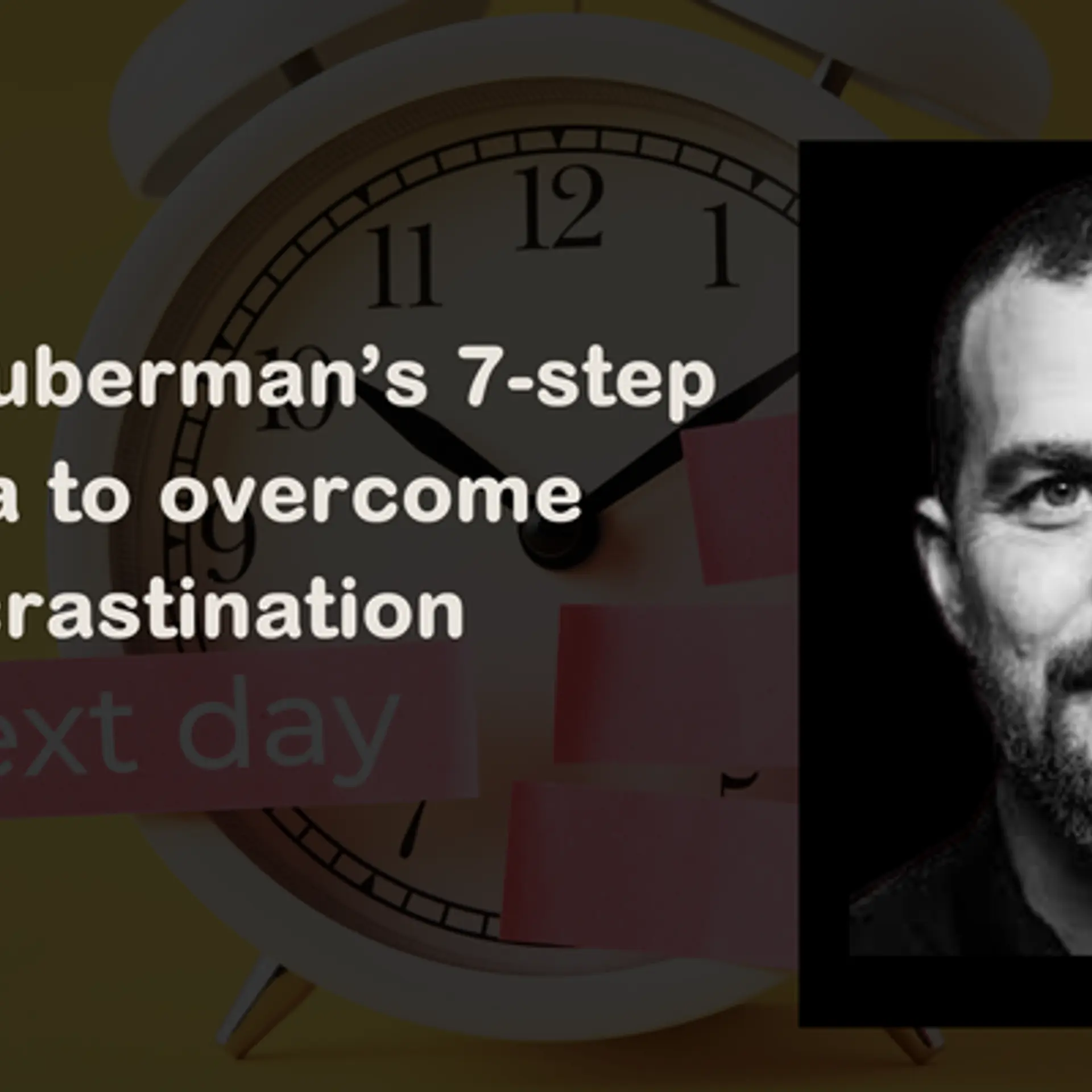10 secrets of Silicon Valley that every entrepreneur should know, by Ellen Petry Leanse
Fifth edition of TechSparks, India’s largest entrepreneurship event culminated yesterday, at The Leela Palace, Bangalore. The grand finale event had all the elements in it to be thought of as the ’Oscars of startups’. Likes of Nandan Nilekani, Ellen Petry Leanse, Ramesh Srivats, Ravi Venkatesan, Arunabh Kumar and other visionaries shared their success secrets with the young entrepreneurs. The heroes of the show, Tech30 companies received massive appreciation and recognition for their promising future.
The stage was perfectly set for the guest of honor, Ellen Petry Leanse, to share some of the secrets of Silicon Valley with the fullhouse buzzing with Indian entrepreneurs. Here’s everything you would like to know about ‘What makes Silicon Valley, what it is today’?

What makes Silicon Valley such a resilient, powerful economic region?
In their book ‘What makes Silicon Valley tick?’, Tapan Munroe and Mark Westwind explained,
“Silicon Valley has been an ecology of innovation, where research universities, entrepreneurs, investors, a talented workforce, social and professional networks, a vibrant business environment, and the quality of life; help transform ideas into new products and services.”
Vivek Wadhwa, the well known Indian-American technology entrepreneur and academic, once mentioned,
An open-minded and diverse population that readily shares information, encourages experimentation, accepts failure and dispenses with formality and hierarchy is what makes Silicon Valley the successful.
Things you should know about Silicon Valley
1. Silicon Valley will never be replicated
The formula of Silicon Valley was always the same: select a hot industry, build a science park next to a research university, provide subsidies and incentives for chosen industries to locate there, and create a pool of venture funding. But sadly, the magic never happened – anywhere. Hundreds of regions all over the world collectively spent tens of billions of dollars trying to build their versions of Silicon Valley.
2. But, that’s a GOOD thing
Quoting the example of Kenya, Ellen mentioned,
“Leapfrogging the Valley by taking mobile payments live, Kenya is making the internet available wherever you are, and streamlining rural supply chains in all new ways.”
It is important to know what helped Kenya and other countries with similar success, lead the world? They looked close to their own reality rather and applied their talent to solving problems close to home. They are also adding spark to the ecosystem around them, beginning a unique groundswell of their own.
Ellen said,
No one ever won a race by chasing a front-runner. We win when we learn how their race was won, and apply our talent toward our own course.
3. Silicon Valley isn’t the end game. The game is only starting
Ellen invokes the very fundamental attribute of human behavior and questions the satisfaction on Silicon Valley’s success. She said, “We’ve been makers, innovators since the first arrowhead. There’s so much to be built and discovered ahead of us. But iterating on current reality offers a limited upside. Really, there’s never been a more urgent, promising time to “Think Different.”

4. The goal can’t be the money
Design thinking begins with empathy. It focuses on process, not outcome: small steps that lead to large-scale change. If we focus on the industries or areas we know, especially if they’re underserved by innovation, and focus on the problems they’re trying to solve, we’ll create the changes that lead to the creation of value. If we focus on the creation of value, we may or may not get it. And we may lose the chance to make the right impact.
Ellen mentioned,
The foundation of innovation was built before VC even existed, before fortunes were envisioned, let alone made. In my belief, Silicon Valley would have never taken shape if those early game-changers had been doing it for the money.
5. Understand the problems as well as you do the solutions:
What built the Valley - and what will build the next wave - will be grand-scale dissatisfaction with what we today call solutions: solutions to transportation problems, to environmental issues, to the way people connect, communicate, pay for things, stay healthy, and master the challenges of modern life. According to Ellen,
Maybe the best secret of the Valley is that we all need to look up from it and at the real-world issues innovation can challenge and solve.
6. We need more than our heads to move ahead
Empathy, creativity and intuition are equally important to be taught early in life. The traditional STEM(Science, Technology, Engineering, Mathematics) in academics needs to be replaced with STEAM (A for Art). This exercise induces a sense of community, of being part of something bigger.
7. The next wave will rise from a new wave of innovators
In the valley and far beyond, the most interesting innovations are coming from people whose demographics have until now been underrepresented in tech.
Considering that the first wave of problem solvers has already done their best work. The next wave will look at problems differently. They may be closer to the problems - more directly impacted by them. Ellen posed an important thought in front of everyone,
Which begs a question all of us should be asking: Who is the next Steve Jobs? And who is teaching her?
8. We do, however, ‘Think Different’

a) Curiosity: We’re curious. We wonder. We question. We want to know more. We like geeking out simply for the fun of geeking out, and sometimes a good idea even comes from it. Curiousity is one of the greatest gifts an innovator can have. Wanting to know how things work and how to make them work better is the mark of an innovator. Be curious. If you’re already curious, be MORE curious. The more you learn, the more you see. The more dots you can COLLECT, the more you can ultimately CONNECT.
b) Iteration: We should constantly be iterating and never be afraid to reinvent ourselves. This echoes the thinking about not chasing any other winners. There’s definitely a lot to learn from others but we should not be tethered to them.
c) Maker: We are makers, tinkerers, builders and hackers. There’s a reason the top companies in the Valley offer bike shops or print studios on campus. They know that our brains work best when we move between odalities.
Ellen said,
Imagine the insights a software engineer might gain from building a bike, or understanding the lay-down processes in screen printing. The physical world adds context and perspective to the digital one, and in the Valley we do a good job of remembering that. In a fast changing world, I believe we all have much to gain by holding on to our “real world” maker abilities and traditions.
d) Outliers: So much of our society urge us to conform. To silence the unique voices inside ourselves, to tell ourselves we’re the only ones who see things that way. Ellen stated,
“Fight that! It’s exactly the things that make us unique that align us to succeed. The Valley attracts, accepts, and even elevates a wide range of personality types.”
More and more we give people courage to embrace their inner outliers and take the leaps that point them toward their dreams. The world needs more outliers.
9. We need some help staying real
When you look at the Valley today, you’ll see it off on some directions that reflect its reality - not a more global one. You’ll see products, even fundings, that don’t reflect design thinking, or empathy, or even sometimes innovation. You’ll see me-toos that are in it for the money, people who aren’t curious or willing to iterate, people who think they’ve already figured things out without really feeling the problem.
Don’t be like that. Give us a glimmer of what happens when you stay real, when you focus on the things that really need to change. We could use a bit of that so that we get back to it ourselves - maybe in collaboration with you.
“We don’t want to be the next Google. We want to be the first “something.” Yes!
10. All of this is here
Look at Bangalore, this amazing melting pot. People come from across India and beyond to collaborate here. Think about having the benefit of one of the world’s most long-lived, ever-evolving philosophical legacies: talk about iteration. Ellen emphasized,
“Your rich, colorful culture combines with your commitment to technical and science education to cross train your world view. Making, diversity, a multi-faceted ecosystem, and certainly outliers: all of the ingredients are here.”
Conclusion
If you’re staring at the Valley, you’ll certainly miss the best view. An ecosystem of thriving Valleys is better than one dominant one.
Ellen concluded her insightful session with this chain of thoughts,
“If there’s one thing we have in the Valley, it’s the audacity to believe we can change the world. We’ve created our own reality, and it’s one much of the planet looks to, admires.
But remember that this thinking didn’t originate in the Valley. In fact, much of it originated here, right here in India, and it inspired some of our most admired and impactful leaders. Use your time at TechSparks to open up your own thoughts. What really is possible? What’s the dent in the universe we, YOU, are here to make?
How can you look to the secrets of Silicon Valley - realize that you already knew them, otherwise you wouldn’t be here – and decide how you will use your own talents, vision, and pursuit of meaning to take your unique thoughts - and turn them into reality?
I know you’ll do it. I’ll be cheering for you.
Here is the list of top 30 technology companies that showcased at TechSparks.







